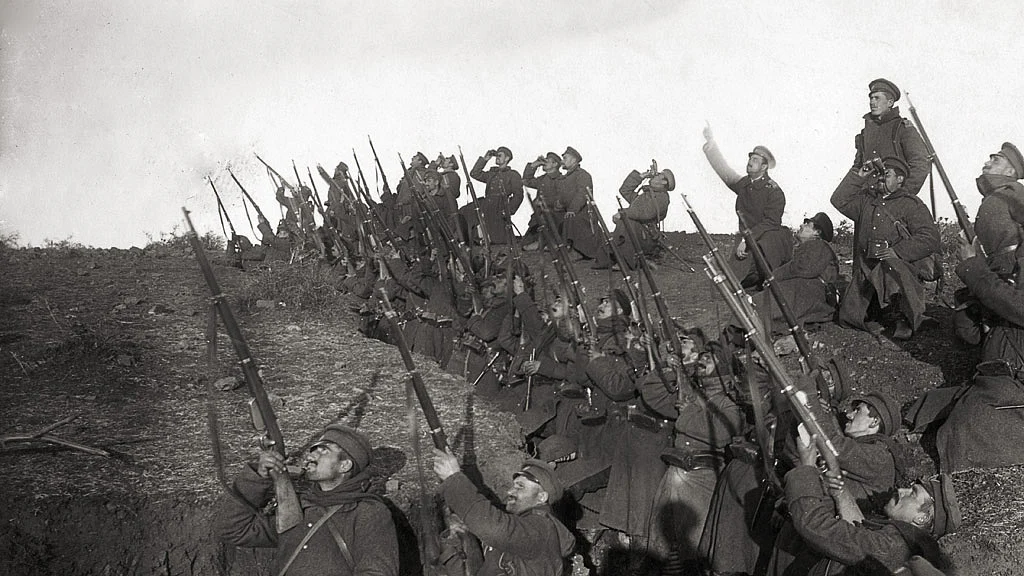Lessons from World War I: The perils of nationalism
Citizens across the world should be wary of tough-talking leaders espousing a virulent form of self-attested love for their country and the people

Today marks the 100th anniversary of the end of the First World War, the first conflict in history that was played out across the world – Europe, Africa, coasts of North and South America, Pacific Islands, West Asia and the Indian Ocean.
While French President Emmanuel Macron has used this opportunity to visit the places where the battles took place in France and to warn of the perils of nationalism, there is something inherently wrong and introspectively right about that. While one understands that the French President is apprehensive as conservative, anti-immigrant right-wing forces, who have come to power in various countries of Europe, look set to topple his liberal counterpart in Germany, to say the First World War was a product of unbridled nationalism is not simply fallacious but purely ahistorical.
The First World War was simply a complex product of the realignment of post-Napoleonic and post-Habsburg Europe which was marked by Britain’s Splendid Isolation; the rise of Prussia since 1848 under the leadership of Otto Von Bismarck which was capped by Prussian victories over Austria and France in 1866 and 1871 respectively, followed by the creation of the enlarged German Reich; and the Russian Empire’s victory over the Ottoman Empire in 1878 and growing Russian influence in the Balkans. The First World War was a war between empires. Imperialism was at its core and no nationalism.
Gavrilo Princip, the Bosnian Serb who assassinated the Austro-Hungarian heir Archduke Franz Ferdinand, a nephew of Austro-Hungarian emperor Franz Joseph, in 1914 in Sarajevo, was a Yugoslav nationalist who sought unification of entire Yugoslavia and breaking free from Vienna’s rule. He was a patriot in that sense and not a nationalist. It is this incident which set a series of events in motion that led to the beginning of the First World War.
When one talks about Adolf Hitler’s Nazi Germany or the RSS’ concept of Hindutva, one is talking about nationalism, of exclusion of ‘others’, of the need to establish political, economic and cultural hegemony over the ‘others’
There is a big difference between patriotism and nationalism as we understand the concepts today. Patriotism is love for one’s country and its people. Nationalism is xenophobic love for one’s country and its people, based on the false premise of territorial, racial, linguistic, ethnic, religious, cultural or any other forms of superiority. The ‘others’ are singularly inferior. This is at the core of nationalism. When one talks about Adolf Hitler’s Nazi Germany or the RSS’ concept of Hindutva, one is talking about nationalism, of exclusion of ‘others’, of the need to establish political, economic and cultural hegemony over the ‘others’. A patriot loves his country and is proud of what it does and, at times, may express his reservations about certain actions of his or her country which he or she feels are harmful for the country. A nationalist loves his country no matter what it does, even if it means extermination of 6.5 million Jews like it happened during the Holocaust. Criticism of State policy is not the forte of nationalists.
That way, Macron’s assertions fail to establish a direct link between nationalism and the First World War. However, fast forward to the 1930’s Europe and he is introspectively right. The supposed humiliation of the Treaty of Versailles of 1919 and the economic ramifications of German Reparations where Germany was to pay over $33 billion to cover civilian damages in the war which it could not do in full, following a collapse of the country’s banks and the economy in the 1930’s, would be used to the hilt by the Nazi Party and Adolf Hitler to whip up nationalistic sentiments and plunge the world into a war, unprecedented in scale, firepower and destruction in history. The Second World War would claim between 60 and 85 million lives as compared to 16 million in the First World War.
Nationalists, and especially cultural nationalists, who believe in ethnic, racial, cultural and religious superiority over the ‘others’, have been bad news for the very people whose cause they claim to champion. It took the Germans and to a lesser extent, the Japanese (before Hiroshima-Nagasaki), the complete destruction of their country to realise that. Today, the Nazi Swastika is banned in Germany and a Nazi salute is a punishable offence with six months in prison.
So, on this anniversary of the end of the First World War, in which were contained the seeds of much greater destruction which would germinate in the 1930's only to reach fruition in 1939, citizens across the world should be wary of tough-talking leaders espousing a virulent form of self-attested love for their country and the people. A common trait amongst them is branding every opponent as a traitor. They are also typically xenophobic, anti-immigrant and harbour a unique disdain for intellectuals. They are also masters at hatching conspiracies to capture political power and usually can go to any length to cling on to the same. As Indians living under the BJP rule of Narendra Modi, we have to be extra careful.
Follow us on: Facebook, Twitter, Google News, Instagram
Join our official telegram channel (@nationalherald) and stay updated with the latest headlines